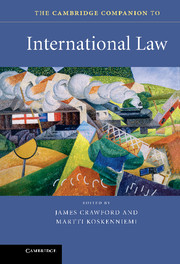Book contents
- Frontmatter
- Contents
- Preface
- Notes on contributors
- Introduction
- Part I The contexts of international law
- Part II International law and the state
- Part III Techniques and arenas
- Part IV Projects of international law
- 12 Constituting order
- 13 Legitimating the international rule of law
- 14 Human rights in disastrous times
- 15 Justifying justice
- 16 Regulating trade, investment and money
- 17 Divided against itself
- 18 Conserving the world’s resources?
- Guide to electronic sources of international law
- International law chronology
- Select guide to further reading
- Index
- References
14 - Human rights in disastrous times
from Part IV - Projects of international law
Published online by Cambridge University Press: 05 July 2015
- Frontmatter
- Contents
- Preface
- Notes on contributors
- Introduction
- Part I The contexts of international law
- Part II International law and the state
- Part III Techniques and arenas
- Part IV Projects of international law
- 12 Constituting order
- 13 Legitimating the international rule of law
- 14 Human rights in disastrous times
- 15 Justifying justice
- 16 Regulating trade, investment and money
- 17 Divided against itself
- 18 Conserving the world’s resources?
- Guide to electronic sources of international law
- International law chronology
- Select guide to further reading
- Index
- References
Summary
C.L.R. James’s book The Black Jacobins tells the story of the Haitian revolution of 1791–1803, the only slave revolt in history that brought permanent emancipation and a new independent state (James 1963). Central to the story is the magnificent figure of Toussaint L’Ouverture. A former slave, he became the pre-eminent leader of the revolt, but lost the chance to lead it to its conclusion when, in 1802, he was arrested and taken to France. Imprisoned in the mountains of the Jura with deficient heating and reduced rations, he died nine months after arriving there.
James’s book was originally published in 1938, and then revised and reissued in 1963. In a recent work, David Scott calls attention to an intriguing feature of the revisions that James made for the book’s second edition, namely that he shifted the register of his story from romance to tragedy (Scott 2004). Whereas in the original version James told a romantic tale of revolutionary triumph, in the revised edition there was a new emphasis on Toussaint’s tragic predicament, and on the dilemmas, disappointments, ironies and uncertainties of enlightenment and liberation.
The aspect of international law which is the subject of this chapter is human rights, and I shall be showing how, in that very different context, something similar can be observed.
- Type
- Chapter
- Information
- The Cambridge Companion to International Law , pp. 309 - 326Publisher: Cambridge University PressPrint publication year: 2012
References
- 5
- Cited by

